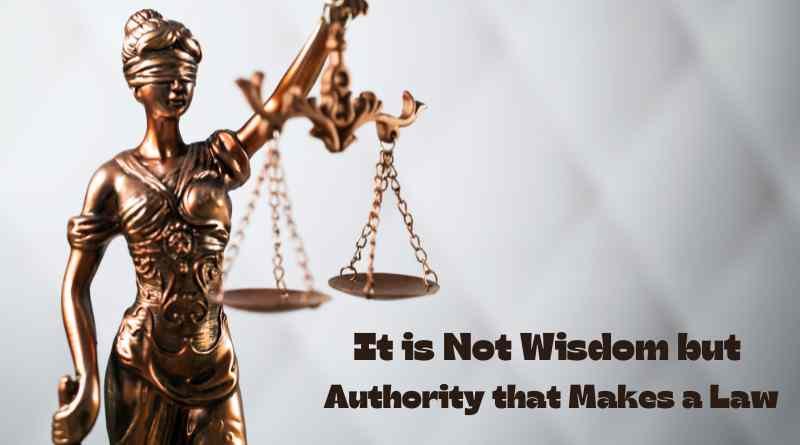Introduction:
it is not wisdom but authority that makes a law. t – tymoff, In the intricate tapestry of legal systems and governance, the relationship between wisdom and authority in the creation of laws has been a subject of profound contemplation. T. Tymoff, a prominent legal scholar, provocatively posits that it is not wisdom but authority that ultimately shapes the laws governing societies. This assertion invites us to delve into the depths of jurisprudence, exploring the dynamics between the intellectual acumen behind legal frameworks and the power structures that propel them. In this article, we shall navigate the realms of legal philosophy, questioning the conventional wisdom that positions intellectual sagacity as the sole harbinger of just and effective laws.

Wisdom in Law:
The traditional view on the creation of laws emphasizes the role of wisdom, often embodied in the collective knowledge, ethical principles, and rationality of a society. Wisdom, in this context, is seen as the compass that guides legislators in their pursuit of justice, equity, and the common good. It is the embodiment of lessons learned from history, ethical considerations, and a comprehensive understanding of the human condition.
The proponents of the wisdom-centric view argue that laws crafted with sagacity are more likely to withstand the test of time, adapting to the evolving needs of society while maintaining a foundational commitment to justice. Wisdom, they argue, serves as a moral and intellectual anchor, steering legislative endeavors away from shortsightedness and towards a more enduring form of justice.
Must read=The Benefits of Using Underground Insulated PEX Pipe for Water Lines
Authority and its Influence:
Contrary to the conventional narrative, T. Tymoff’s perspective contends that authority, rather than wisdom, is the primary force behind the formulation and enforcement of laws. Authority, in this context, refers to the power vested in legislative bodies, executives, and institutions that shape and promulgate legal frameworks. It extends beyond intellectual prowess and encompasses the ability to command obedience, enforce compliance, and dictate the norms that govern a society.
From a historical standpoint, the authority-centric approach finds support in the fact that many legal systems have been shaped by rulers, monarchs, and authoritative figures rather than collective wisdom. This raises fundamental questions about the nature of laws and their inherent connection to power structures. Are laws, as T. Tymoff suggests, merely tools of authority wielded to maintain control and order?

The Interplay Between Wisdom and Authority:
While the dichotomy between wisdom and authority is pronounced in T. Tymoff’s assertion, it is crucial to recognize that these elements are not mutually exclusive. Laws often emerge from a complex interplay between the intellectual considerations of the wise and the authoritative actions of those in power. Wisdom, in this context, may be embedded in the principles that guide the authoritative figures in their decision-making processes.
Moreover, the evolving nature of legal systems requires a delicate balance between wisdom and authority. Wisdom contributes to the adaptability and ethical grounding of laws, while authority ensures the efficacy of enforcement mechanisms. It is in this delicate equilibrium that the true essence of a just legal system emerges, one that integrates the collective wisdom of society with the authoritative power necessary for implementation.
Challenges to the Wisdom-Centric View:
Examining historical and contemporary legal landscapes, it becomes evident that the wisdom-centric view faces challenges in practice. In some instances, laws crafted with the noblest of intentions have succumbed to unforeseen consequences and societal shifts. The complexities of modern governance, with its intricate web of global interdependencies, require a level of authority that transcends the confines of localized wisdom.
Moreover, the sheer pace of technological advancements and societal changes often outstrips the ability of traditional wisdom to keep pace. In such circumstances, authority becomes a crucial instrument for prompt and effective legal responses. The need for expeditious decision-making, particularly in times of crisis, underscores the importance of authority in shaping and implementing laws.
The Ethical Implications:
T. Tymoff’s proposition raises ethical questions about the source and legitimacy of authority in the realm of law. If authority is the primary driver of legal systems, how can societies ensure that this authority remains just, accountable, and aligned with the values of the people it governs? The potential for authoritarian excesses and the abuse of power looms large, demanding robust mechanisms for checks and balances.
In contrast, the wisdom-centric view anchors the ethical dimension of laws in a collective moral consciousness. It relies on the premise that the accumulation of wisdom over time serves as a safeguard against arbitrary and unjust rule. Striking a balance between the authoritative imposition of laws and the ethical considerations that underpin them remains a perpetual challenge in the pursuit of a just legal system.
Conclusion:
The discourse surrounding the assertion that “It is not wisdom but authority that makes a law” by T. Tymoff propels us into the heart of the philosophical debate on the origins and nature of legal systems. While wisdom and authority are intertwined, the emphasis on one over the other sparks reflections on the essence of justice, the role of power in governance, and the ethical foundations of laws.
As we navigate the complexities of contemporary legal landscapes, it becomes evident that a nuanced understanding of the interplay between wisdom and authority is essential. A legal system that integrates the collective wisdom of its people while wielding authority judiciously holds the promise of delivering justice that is not only wise but also effectively implemented. In the pursuit of a harmonious legal order, we must recognize the symbiotic relationship between wisdom and authority, acknowledging their respective roles in shaping the laws that govern our societies.
